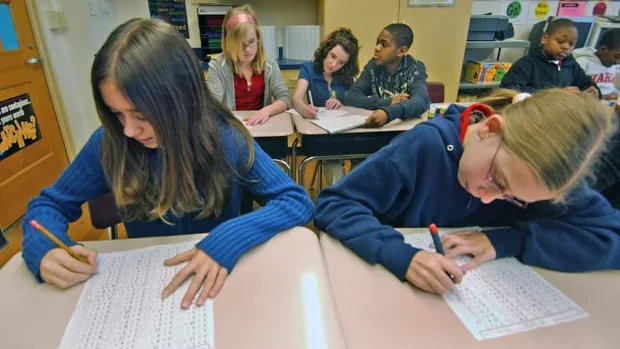Ontario reading test scores inflated by assistive technology, report says
Scores for Ontario standardized-reading tests have been inflated by the use of assistive technology, according to a recent report.
The Ontario branch of the International Dyslexia Association (IDA) examined data from the standardized reading tests administered by Ontario's Education Quality and Accountability Office (EQAO) dating back to 2005.
Between 2005 and 2019, EQAO has reported a steady increase in reading scores for students in grades 3 and 6. The report notes, however, there is an increasing number of students, most with a learning disability, who use assistive technology to complete the test, which can inflate the numbers.
"There are so many students out there who's experiences are being hidden right now in the EQAO reporting," Alicia Smith, president of the IDA's Ontario branch, told CBC Radio's Ontario Today.
Assistive technology allows students who have been identified as having difficulty reading to listen to an audio version of the text and comprehension questions. Often these students are accompanied by an adult, either a teacher or volunteer, who can then write down the students' verbal response.
Nearly 1 in 5 students used technology in 2019
The report says nearly one in five students, 18 per cent, used assistive technology to complete the EQAO assessment in 2019, which was up from three per cent in 2005.
Smith argues the technology is being used as a crutch rather than a learning tool.
"We should never be providing the assistive technology in place of teaching children to read," she said.
For the Grade 3 reading test, 59 per cent met the provincial standard in 2005. That jumped to 74 per cent in 2019.
The IDA report found students who met the standard without the use of assistive technology was 56 per cent in 2005 and only 62 per cent in 2019.
WATCH | Father says assistive technology doesn't help reading skills:
David Logan, whose son has struggled with reading, says he doesn’t believe the assistive technology offered by his school is actually helping him learn reading skills — and that there’s no plan to help him progress past needing the device. 1:06
'Not a practical solution'
David Logan's son Noah is currently in Grade 5 but struggled with reading in earlier grades, and was later diagnosed with a learning disability.
Since then Noah's school in Kingston, Ont., has pushed him to use assistive technology, which his father says is "not a practical solution" and won't help his son improve his literacy.
"I can't understand how him listening to the device and then speaking to someone to get it [written] down is going to help," Logan said.
Logan said assistive technology won't be able to help his son outside the classroom, so he does not want him to use a crutch.
"There is literally no plan to get him off that device," he said. "It almost feels like he's been written off."

Students need to sound out words
Logan and his wife sought a private reading clinic to help their son, who they say is now close to reading at the same level as his classmates.
Many Ontario parents take similar steps, Smith added, but most families can't afford private tutoring.
Her association wants the provincial government to change the curriculum to focus more on teaching children to sound words and letters out, and initiate a screening test as early as kindergarten to identify children who may have reading difficulties.
A spokesperson for Ontario Education Minister Stephen Lecce said assistive technology doesn't change a student's ability to understand content in the EQAO assessment, only the way the assessment is administered.
Lecce's office also said it is closely watching an Ontario Human Rights Commission inquiry on services provided to students with learning disabilities specific to reading. The inquiry report is expected to be released in February 2022.








Gloss